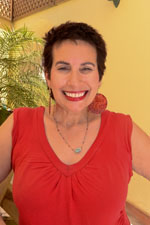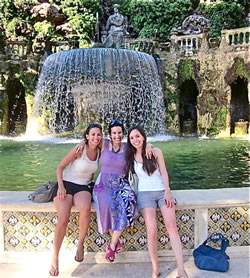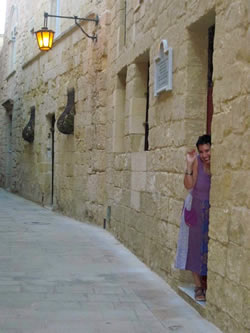- Home » Expat Articles » Interviews » American Expat In Malta - Interview With Ilene
American Expat In Malta - Interview With Ilene
| Published: | 14 Nov at 1 PM |
Want to get involved?
Become a Featured Expat and take our interview.
Become a Local Expert and contribute articles.
Get in touch today!
Become a Local Expert and contribute articles.
Get in touch today!
Filed: Interviews,Malta
In 2008, Ilene Springer met Senator Obama at a Democratic rally in Dover, New Hampshire, before he was elected president. Within a couple of weeks, she moved from the US and became an expat in Malta (south of Sicily). Why does a 55-year-old woman, successful writer and mother of two grown daughters leave the US? Ilene had lost her job and her health insurance and would have had to make the excruciating choice between paying her rent or paying her health insurance premiums which had skyrocketed to $900 per month when she left four years ago. Four years later, after President Obama has been reelected, looks back on the roller coaster ride of becoming an American expatriate. Ilene blogs at An American in Malta (see listing here)

Ilene, where are you originally from?
I have always lived on the East Coast in the US--upstate New York; Boston; New Hampshire. Right before I left in 2008 on the eve of the presidential election, I was living in Dover, New Hampshire.
In what country and city are you living now?
I’m in Sliema, Malta (a set of three small Mediterranean islands south of Sicily). Sliema is a waterfront city. The views of the water are beautiful but the coastline is very built up--like Miami Beach and very touristy. But it’s a very central location and near to all the English language schools where I’ve been teaching English as a Foreign Language (EFL).
 How long have you lived in Malta and how long are planning to stay?
How long have you lived in Malta and how long are planning to stay?
It’s been four years since I left Logan airport in Boston with my cat back in 2008. I think I’ll be staying indefinitely because I, at this point, can’t afford to go back to the US. I wish I had the choice, although you can’t beat the Mediterranean climate here in Malta. I could never go back to live where I had previously in the US (as I write this, Hurricane Sandy is pelting the whole East coast) because of the weather.
Why did you move and what did you do?
It wasn’t because I liked to travel. I don’t actually like traveling. But four things in a span of six years happened in my life before I left: I got divorced after 22 years of marriage, I met a German man online in a chat room for people who love ancient Egypt), I lost my job and then--the biggest catalyst--my health insurance premiums began to skyrocket. Before I left in 2008, they were over $900 a month. That was the same as my rent. It came down to a choice between paying my rent or being able to pay for healthcare, including medicines I already take.
So how did you choose Malta?
I discovered Malta through my partner who was the German man I had met online; his marriage had also gone on the rocks. (Actually, he’s part Austrian and part British--a dangerous combination, but at least, we’re on time for everything whether I want to be or not.) He had vacationed often in Malta and hoped someday to retire there. He was willing to come and try to live in the US, but then we would have had two health insurance problems. Malta has English as a second official language, so I thought I could get trained to teach EFL. During one visit before we moved, I fell in love with Malta in the capital city of Valletta at sunset when all the colors of the Medieval limestone architecture came alive.
 Did you bring family with you?
Did you bring family with you?
I brought my cat Egypt with me. And my partner came to settle in Malta several months after I did. He had gotten a good early-retirement offer from his company in Germany and stayed to fulfill his contract. The hardest part of everything was--and still is--leaving my daughters behind. It was a very painful process and my daughters told me I was deserting them, and I don’t blame them for feeling or saying that. But my partner and I waited until my younger daughter graduated college at the age of 22. That was the earliest I felt I could leave them. One lives in Boston now, the other moved to San Francisco while I was in Malta.
How often do you get to see your daughters?
Thank G-d, it’s been at least twice a year recently, sometimes more. But for me it’s never enough. I go to Boston for Thanksgiving and my daughter from San Francisco and my brother from Albany, New York, fly in for a few days. Believe it or not, I join my daughters’ father and his new wife and a lot of friends for Thanksgiving. We’re lucky we all get along together. Then in the summer, my daughters both try to come to Malta--which they love. It’s a great place for them to visit and they often bring friends. And, of course, there’s SKYPE. I would love to say we get to speak every day but we don’t because of the time differences between San Francisco and Boston and Malta. Generally, when I’m waking up, they’re going to sleep. Sometimes, as much as you miss family, you just don’t feel like talking, especially if you’re in a bad mood.
How did you find the transition to living in a foreign country?
It’s been difficult to say the least. It’s been four years and I still can’t accept some things. On the other hand, I thank G-d every day that I had the chance to move to a beautiful place where I can work and pay into the national healthcare system--something I didn’t have in the US (which is an absolute sin) and which many unfortunate Americans still don’t have. At least, I found an alternative to survive; many people don’t survive physically or financially in the US because they don’t have any--or have very inadequate--health insurance. However, working in a foreign country can be very daunting because you are now the foreigner. I was lucky, as a non-European Union member from America, to get a job here teaching. But after four years of working in the language school industry in Malta, I’ve had it. EFL teachers, foreign or not, are treated as cheap labor in Malta and are often tricked into signing contracts from which they can’t get out of. Luckily, I’ve just finished with the language school system here and have started on my own as a freelance EFL teacher. It will take a while to get going but I feel that I will be happier in the long run. On the other hand, my partner who has not had to work here, has adjusted much better to Malta.
What has been the hardest part of the transition?
I haven’t been able to get used to how dirty Malta is. People throw plastic bottles, food refuse, cigarettes--garbage of all kinds--on the streets in front of their houses and shops. They are getting a bit better about the dog poop, though. It’s the law now, but not hardly enforced, that dog owners must dispose of the dog poop in plastic bags. There’s also a lot of noise. There are no laws restricting noise; people can start hammering away; fight or let their dogs bark at any time of the day or night, and the police do nothing if they are called. The last main thing that bothers me is the acceptance of ineptitude as a way of life here. When something doesn’t work or goes wrong, or public projects remain unfinished, the people themselves say, ‘It’s Malta.” It’s an excuse for everything here--the bad roads, the bad service in many shops, the terrible bus system. It often seems like the people have no pride in their country’s appearance or environmental health.
Has anything helped with the transition?
Yes, in fact, my blog has helped - in several ways, actually. It’s been kind of therapeutic for me to write the blog. Good things, bad things, funny things. I’ve had a really good response from the blog. I’ve met people who moved to Malta because of the blog. I met a private EFL student via the blog. A German expat found a job through the blog. It’s grown in popularity and I’ve had some international companies advertise on my blog. Then three years after starting it, I was contacted by a publisher who was interested in a book based on it. That resulted in The Diary of an American Expatriate, published by AUK in London this past July, 2012.
 How is the book doing?
How is the book doing?
It’s doing well. It’s not exactly selling like Fifty Shades of Grey, but lots of people have asked when the sequel to my book is coming out. It will, but not until 2013.
Was it easy making friends and meeting people; do you mainly socialize with other expats?
One of the best things about Malta is that it’s easy to meet people--both other expats and native Maltese. Part of it has to do with the generally good climate, I think. I hang out mostly with other expats (the majority I meet are from Germany). I have enjoyed working with many of my school colleagues who are mostly Maltese. Being a language school haven and a Mediterranean tourist attraction, the Maltese are used to and like most foreigners. Unlike the East coast of the US where I hail from, people are quite casual about getting together on short notice; you don’t need an appointment to make an appointment to see each other. The sense of community is great here. I really love running into people I meet on the street and having a small meaningful chat if there’s time. It seems less superficial here.
What are the best things to do in the area; anything to recommend to future expats?
For a small island, there’s a lot to do. There’s hiking or walking in the countryside, shopping in small boutiques, swimming, snorkeling and scuba diving in the summer. There are several cinemas with the latest movies, there’s horseback riding and sitting in outdoor cafes throughout the entire year, small museums, the earliest stone architecture known here in Malta to see, walking through beautifully preserved fortified cities from the Middle Ages (Mdina and Valletta) and good Mediterranean food. The only thing you can’t do easily or safely is bike riding--which I miss. The traffic is too dangerous and the roads are very steep.
 What do you enjoy most about living here?
What do you enjoy most about living here?
My answer is the same as everyone else’s: the climate. There is sunshine most days in the year, although it can get very cold inside during the winter because there’s no central heat. But I never realized how much sunshine helped my mood until I moved here. And the best part of all? In the summer, there’s no rain for four months! I also think the healthcare/medical care is very good. I’ve had some things diagnosed here by Maltese doctors that were misdiagnosed in the US.
How does the cost of living compare to home?
In most respects it’s cheaper, and that’s why I moved here in the first place. The rent is cheaper and you get a lot more money than you would for the same size place in the US. Food is about the same it seems to me. Good restaurants are a bit cheaper. Paying privately for routine medical care and medicines is tremendously cheaper here for the same quality of care, I would say. The private health insurance is as bad as it is in the US right now--with excluding preexisting conditions. However, the premiums for basic health insurance is a lot cheaper than in the US. The main problem with all American expats who move to Malta is the exchange rate of the USD to the Euro: I lose one third of what I bring over to Malta now. But even considering that, it’s still cheaper to live here than in the US.
What negatives are there to living in Malta?
There is a laissez-faire attitude about a lot of things here which irritates anyone coming from the US, Britain or German. The Maltese seem to tolerate, even expect, irresponsibility. That pertains to the garbage in the streets, no laws about controlling the noise of dogs, very dangerous driving that has resulted in pedestrians being killed with no judgement against the driver. The public transportation is terrible, unreliable and inefficient--and many of the things that expats complain about are the same things the Maltese complain about themselves.
If you could pick one piece of advice to anyone moving here, what would it be?
After you’ve seen the best parts of Malta as a tourist, come and stay for a month in a rental apartment during the worst part of the year. It could be the winter when it’s rainy, very windy and freezing in the apartments because of no central heating. Or it could be during July, August and September when you can’t walk in the sun after 9 am because it gets so hot. Try Malta during the worst time of the year here and if you still like it, then try moving here.
What has been the hardest aspect to your expat experience so far?
I would say the following:
 If and when you finally do return to the US, how do you think you’ll cope with repatriation?
If and when you finally do return to the US, how do you think you’ll cope with repatriation?
That depends on the reason I would return to America. If it was my choice and I could afford to live there, I think it would be OK. If I had to leave Malta and had no other place to go and would have to live in poverty in the US, that would be very bad. I would like to have the choice to live back in the US. Almost all other expats from other countries do have their homeland to return to. And many do. Some would rather not, but they can’t find a job in Malta. Others get fed up with Malta and return to their homes. But I can’t. I’m not a wanted criminal; I just could’t afford health insurance anymore at my age.
What are your top five tips for anyone following in your footsteps?
Tell us a bit about your own expat blog.
I’m thankful that the Maltese are a generally peaceful people. Otherwise, I may have needed a bodyguard by now. I use the blog to tell people what it’s really like to live in Malta--the good and the bad. And I complain a lot. But it seems to work.
How can you be contacted for further advice to future expats coming to your area?
People can post questions on the blog, but I generally can’t help with things like how to get a job, etc., through emails. A lot of those answers are on my or other blogs already, and I always remind people that I can’t give them legal, job or immigration advice. As far as blog advice goes, I think prospective expats should read them for the general feel of the expat’s experience - and then contact official authorities for specific information regarding their own immigration or employment situations. However, I’m happy to answer questions about how I coped emotionally with certain events - and I love to banter back and forth with those readers who leave comments on the blog.
Ilene blogs at http://www.an-american-in-malta.com/ which we recommend a quick visit if you haven't been already. An American in Malta has an ExpatsBlog.com listing here so add a review if you like! If you appreciated this interview with Ilene, please also drop her a quick note below.

Here's the interview with Ilene...
Ilene, where are you originally from?
I have always lived on the East Coast in the US--upstate New York; Boston; New Hampshire. Right before I left in 2008 on the eve of the presidential election, I was living in Dover, New Hampshire.
In what country and city are you living now?
I’m in Sliema, Malta (a set of three small Mediterranean islands south of Sicily). Sliema is a waterfront city. The views of the water are beautiful but the coastline is very built up--like Miami Beach and very touristy. But it’s a very central location and near to all the English language schools where I’ve been teaching English as a Foreign Language (EFL).
 How long have you lived in Malta and how long are planning to stay?
How long have you lived in Malta and how long are planning to stay?It’s been four years since I left Logan airport in Boston with my cat back in 2008. I think I’ll be staying indefinitely because I, at this point, can’t afford to go back to the US. I wish I had the choice, although you can’t beat the Mediterranean climate here in Malta. I could never go back to live where I had previously in the US (as I write this, Hurricane Sandy is pelting the whole East coast) because of the weather.
Why did you move and what did you do?
It wasn’t because I liked to travel. I don’t actually like traveling. But four things in a span of six years happened in my life before I left: I got divorced after 22 years of marriage, I met a German man online in a chat room for people who love ancient Egypt), I lost my job and then--the biggest catalyst--my health insurance premiums began to skyrocket. Before I left in 2008, they were over $900 a month. That was the same as my rent. It came down to a choice between paying my rent or being able to pay for healthcare, including medicines I already take.
So how did you choose Malta?
I discovered Malta through my partner who was the German man I had met online; his marriage had also gone on the rocks. (Actually, he’s part Austrian and part British--a dangerous combination, but at least, we’re on time for everything whether I want to be or not.) He had vacationed often in Malta and hoped someday to retire there. He was willing to come and try to live in the US, but then we would have had two health insurance problems. Malta has English as a second official language, so I thought I could get trained to teach EFL. During one visit before we moved, I fell in love with Malta in the capital city of Valletta at sunset when all the colors of the Medieval limestone architecture came alive.
 Did you bring family with you?
Did you bring family with you?I brought my cat Egypt with me. And my partner came to settle in Malta several months after I did. He had gotten a good early-retirement offer from his company in Germany and stayed to fulfill his contract. The hardest part of everything was--and still is--leaving my daughters behind. It was a very painful process and my daughters told me I was deserting them, and I don’t blame them for feeling or saying that. But my partner and I waited until my younger daughter graduated college at the age of 22. That was the earliest I felt I could leave them. One lives in Boston now, the other moved to San Francisco while I was in Malta.
How often do you get to see your daughters?
Thank G-d, it’s been at least twice a year recently, sometimes more. But for me it’s never enough. I go to Boston for Thanksgiving and my daughter from San Francisco and my brother from Albany, New York, fly in for a few days. Believe it or not, I join my daughters’ father and his new wife and a lot of friends for Thanksgiving. We’re lucky we all get along together. Then in the summer, my daughters both try to come to Malta--which they love. It’s a great place for them to visit and they often bring friends. And, of course, there’s SKYPE. I would love to say we get to speak every day but we don’t because of the time differences between San Francisco and Boston and Malta. Generally, when I’m waking up, they’re going to sleep. Sometimes, as much as you miss family, you just don’t feel like talking, especially if you’re in a bad mood.
How did you find the transition to living in a foreign country?
It’s been difficult to say the least. It’s been four years and I still can’t accept some things. On the other hand, I thank G-d every day that I had the chance to move to a beautiful place where I can work and pay into the national healthcare system--something I didn’t have in the US (which is an absolute sin) and which many unfortunate Americans still don’t have. At least, I found an alternative to survive; many people don’t survive physically or financially in the US because they don’t have any--or have very inadequate--health insurance. However, working in a foreign country can be very daunting because you are now the foreigner. I was lucky, as a non-European Union member from America, to get a job here teaching. But after four years of working in the language school industry in Malta, I’ve had it. EFL teachers, foreign or not, are treated as cheap labor in Malta and are often tricked into signing contracts from which they can’t get out of. Luckily, I’ve just finished with the language school system here and have started on my own as a freelance EFL teacher. It will take a while to get going but I feel that I will be happier in the long run. On the other hand, my partner who has not had to work here, has adjusted much better to Malta.
What has been the hardest part of the transition?
I haven’t been able to get used to how dirty Malta is. People throw plastic bottles, food refuse, cigarettes--garbage of all kinds--on the streets in front of their houses and shops. They are getting a bit better about the dog poop, though. It’s the law now, but not hardly enforced, that dog owners must dispose of the dog poop in plastic bags. There’s also a lot of noise. There are no laws restricting noise; people can start hammering away; fight or let their dogs bark at any time of the day or night, and the police do nothing if they are called. The last main thing that bothers me is the acceptance of ineptitude as a way of life here. When something doesn’t work or goes wrong, or public projects remain unfinished, the people themselves say, ‘It’s Malta.” It’s an excuse for everything here--the bad roads, the bad service in many shops, the terrible bus system. It often seems like the people have no pride in their country’s appearance or environmental health.
Has anything helped with the transition?
Yes, in fact, my blog has helped - in several ways, actually. It’s been kind of therapeutic for me to write the blog. Good things, bad things, funny things. I’ve had a really good response from the blog. I’ve met people who moved to Malta because of the blog. I met a private EFL student via the blog. A German expat found a job through the blog. It’s grown in popularity and I’ve had some international companies advertise on my blog. Then three years after starting it, I was contacted by a publisher who was interested in a book based on it. That resulted in The Diary of an American Expatriate, published by AUK in London this past July, 2012.
 How is the book doing?
How is the book doing?It’s doing well. It’s not exactly selling like Fifty Shades of Grey, but lots of people have asked when the sequel to my book is coming out. It will, but not until 2013.
Was it easy making friends and meeting people; do you mainly socialize with other expats?
One of the best things about Malta is that it’s easy to meet people--both other expats and native Maltese. Part of it has to do with the generally good climate, I think. I hang out mostly with other expats (the majority I meet are from Germany). I have enjoyed working with many of my school colleagues who are mostly Maltese. Being a language school haven and a Mediterranean tourist attraction, the Maltese are used to and like most foreigners. Unlike the East coast of the US where I hail from, people are quite casual about getting together on short notice; you don’t need an appointment to make an appointment to see each other. The sense of community is great here. I really love running into people I meet on the street and having a small meaningful chat if there’s time. It seems less superficial here.
What are the best things to do in the area; anything to recommend to future expats?
For a small island, there’s a lot to do. There’s hiking or walking in the countryside, shopping in small boutiques, swimming, snorkeling and scuba diving in the summer. There are several cinemas with the latest movies, there’s horseback riding and sitting in outdoor cafes throughout the entire year, small museums, the earliest stone architecture known here in Malta to see, walking through beautifully preserved fortified cities from the Middle Ages (Mdina and Valletta) and good Mediterranean food. The only thing you can’t do easily or safely is bike riding--which I miss. The traffic is too dangerous and the roads are very steep.
 What do you enjoy most about living here?
What do you enjoy most about living here?My answer is the same as everyone else’s: the climate. There is sunshine most days in the year, although it can get very cold inside during the winter because there’s no central heat. But I never realized how much sunshine helped my mood until I moved here. And the best part of all? In the summer, there’s no rain for four months! I also think the healthcare/medical care is very good. I’ve had some things diagnosed here by Maltese doctors that were misdiagnosed in the US.
How does the cost of living compare to home?
In most respects it’s cheaper, and that’s why I moved here in the first place. The rent is cheaper and you get a lot more money than you would for the same size place in the US. Food is about the same it seems to me. Good restaurants are a bit cheaper. Paying privately for routine medical care and medicines is tremendously cheaper here for the same quality of care, I would say. The private health insurance is as bad as it is in the US right now--with excluding preexisting conditions. However, the premiums for basic health insurance is a lot cheaper than in the US. The main problem with all American expats who move to Malta is the exchange rate of the USD to the Euro: I lose one third of what I bring over to Malta now. But even considering that, it’s still cheaper to live here than in the US.
What negatives are there to living in Malta?
There is a laissez-faire attitude about a lot of things here which irritates anyone coming from the US, Britain or German. The Maltese seem to tolerate, even expect, irresponsibility. That pertains to the garbage in the streets, no laws about controlling the noise of dogs, very dangerous driving that has resulted in pedestrians being killed with no judgement against the driver. The public transportation is terrible, unreliable and inefficient--and many of the things that expats complain about are the same things the Maltese complain about themselves.
If you could pick one piece of advice to anyone moving here, what would it be?
After you’ve seen the best parts of Malta as a tourist, come and stay for a month in a rental apartment during the worst part of the year. It could be the winter when it’s rainy, very windy and freezing in the apartments because of no central heating. Or it could be during July, August and September when you can’t walk in the sun after 9 am because it gets so hot. Try Malta during the worst time of the year here and if you still like it, then try moving here.
What has been the hardest aspect to your expat experience so far?
I would say the following:
- Adjusting to the time zone changes to be in regular contact with my daughters
- Working for the Maltese English language school system because of the slave attitude the directors--Maltese or British--have toward the teachers
- Adjusting to living full-time with a (German) man who had been a long-term trans-Atlantic lover. Don’t worry, he would say the same thing about me.
- Accepting or, rather, not accepting the terrible noise and garbage in Malta
- Getting used to the prevailing laissez-faire attitude about responsibility in Malta
- Hearing the infuriating and ear-blasting petards, (meaning bomb in French; these are fireworks with just loud, startling noise but no colors) that the Maltese set off all summer long during their festas. They can ruin the summer here because they blast them off in the early morning and throughout the night. Everyone hates them, including most of the Maltese, but they “can’t” stop it.
 If and when you finally do return to the US, how do you think you’ll cope with repatriation?
If and when you finally do return to the US, how do you think you’ll cope with repatriation?That depends on the reason I would return to America. If it was my choice and I could afford to live there, I think it would be OK. If I had to leave Malta and had no other place to go and would have to live in poverty in the US, that would be very bad. I would like to have the choice to live back in the US. Almost all other expats from other countries do have their homeland to return to. And many do. Some would rather not, but they can’t find a job in Malta. Others get fed up with Malta and return to their homes. But I can’t. I’m not a wanted criminal; I just could’t afford health insurance anymore at my age.
What are your top five tips for anyone following in your footsteps?
- Come here if you don’t have to work to stay. The people who enjoy Malta the most are those who are self-sufficient and don’t have to work, such as those who have enough money to retire here. Foreigners who have to work here are, in general, less happy than those who don’t have to work.
- Go to your prospective destination and live there as close to reality as possible. Stay in a rental apartment that you would most likely rent, not a luxury place. Shop at local stores, look into a doctor’s office, experience both good and bad weather conditions.
- If you’re an American, don’t come to Europe unless you know you have a firm job offer. Your tourist visa lasts only three months in Malta and you can’t renew it unless you you have a job and then you become a resident only while you’re employed. Don’t stay past your visa; you can be thrown out of the country.
- Never go anywhere without health insurance coverage. Never assume that your American health insurance covers you in Europe. And if you’re from Europe, you may still have to buy private insurance here in Malta. Remember, also, that most insurance programs won’t accept you as a new member after you turn 60. And no matter what your age, health insurance here will not not cover you for any preexisting conditions. And you have to reveal these conditions because if you don’t and the company finds out, it can throw out your policy entirely.
- Give yourself at least one year or more to adjust to your new country and culture. If you don’t like it after six months, don’t pick up and go back home. You are probably in the middle of culture shock and leaving now would be premature.
Tell us a bit about your own expat blog.
I’m thankful that the Maltese are a generally peaceful people. Otherwise, I may have needed a bodyguard by now. I use the blog to tell people what it’s really like to live in Malta--the good and the bad. And I complain a lot. But it seems to work.
How can you be contacted for further advice to future expats coming to your area?
People can post questions on the blog, but I generally can’t help with things like how to get a job, etc., through emails. A lot of those answers are on my or other blogs already, and I always remind people that I can’t give them legal, job or immigration advice. As far as blog advice goes, I think prospective expats should read them for the general feel of the expat’s experience - and then contact official authorities for specific information regarding their own immigration or employment situations. However, I’m happy to answer questions about how I coped emotionally with certain events - and I love to banter back and forth with those readers who leave comments on the blog.
Ilene blogs at http://www.an-american-in-malta.com/ which we recommend a quick visit if you haven't been already. An American in Malta has an ExpatsBlog.com listing here so add a review if you like! If you appreciated this interview with Ilene, please also drop her a quick note below.
Grab a featured expat badge that links to this interview!
 Copy and paste code to display the Featured Expat Badge:
Copy and paste code to display the Featured Expat Badge:Comments » There is 1 comment

Brooke wrote 13
years ago:
Great interview! Lots of nice information about being an expatriate and living in Malta.





